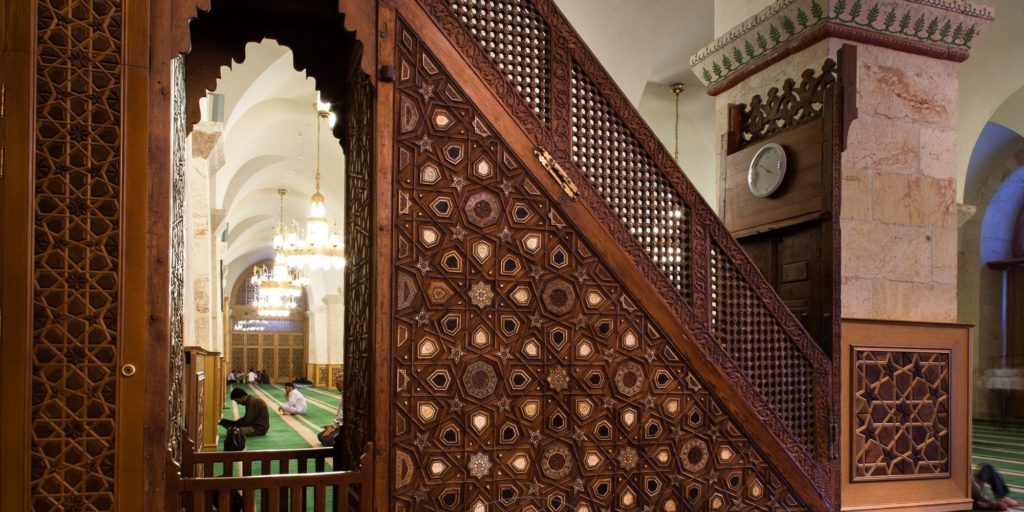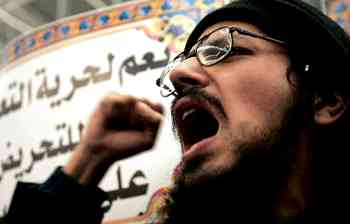
Contemporary religious discourse manifests itself in three arenas: the educational, propagatory and legally prescriptive (fatwā) fields. In each of its faces (politically ideologized conservative traditional – violent radical – centrist moderate), and in its audio-visual and textual media it is in crisis and stands at odds with the situation in contemporary societies.
WHILE THE QUR’ĀN portrayed the Islamic nation as one that calls to charitableness, tolerance, love, harmony, mercy and justice for all mankind, present-day religious discourse fails to realize these aims and purposes of Islam. It has failed to present a positive discourse that is reconciled with the spirit of the age and its demands and which can express the true essence of Islam. The ills and ailments of contemporary religious discourse are many, and specialists have diagnosed these over many years in a number of studies, articles and symposia on the theme of the ‘revival of religious discourse.’ This has particularly been the case after the events of September 11th, events which present the most conspicuous evidence of the failure of religious discourse, and the sum of its tragedies.
There is no room to enumerate the ills of religious discourse at all of its forms and levels, but it is nevertheless important that we clarify here that these ills are not confined to any stagnation in methodologies, conceptions and external aspects, or any negative exploitation of new technologies such as irritating loud hailers or radical websites, or extremist tapes and provocative satellite programmes. Rather these ills embrace the very infrastructure of religious discourse, its content, its components and its purpose. Its greatest flaw is not merely one of form associated with an imperfect exploitation of modern technology to serve Islam and improve its image, but is an inherent flaw, a deep structural weakness. Nor is this weakness one of potential, or resources or support, nor of any weakness in its application or its influence at the level of preachers, missionaries or prominent religious figures. Indeed the opposite is the case.
These ills embrace the very infrastructure of religious discourse, its content, its components and its purpose
The capacities, the sources and budgets of religious institutions at their various levels are vast and immense, and the reach of missionaries and the extension of their authority is increasing in the field every day thanks to mosque pulpits, satellite channels and all manner of social programmes. In the month of Ramadan religious discourse dominates the field without a rival. What is important here, and to allay the doubts and suspicions harboured concerning the up-and-coming preachers of renewal, is to stress that calls for reform of the religious discourse are not intending to contradict or touch upon unchangeable religious verities, but focus on the discourses of preachers, sermonizers, muftis and scholars, as they are broadcast and published. This is because these constitute ‘human interpretation’ of the sacred religious texts, carried out in a contemporary social environment, and contributing overtly to the formation of the Muslim’s conscience. They govern his behaviour and contribute to constructing his thoughts, his perceptions and his view of others, whether with respect to his own society (its citizens and residents) or the ruling political order in his country, or other, non-Muslim, peoples or with respect to contemporary culture in a general sense.
In addition to that, there is a renewed basic old demand, which has no connection to what the religious leadership haunted by conspiratorial fears puts out with the aim of tarnishing the reputation and standing of the preachers of reform and poisoning the intellectual arena, that the renewal of religious discourse is being dictated by the West and by America. According to these, the reform seeks to cancel out the verses of jihad and westernize or obliterate our religious identity, out of some lingering malevolent Crusaderism against Islam and the Muslims, so that Muslims turn into loyal followers of the West and even become their carriers. This is what some of the religious leadership in the Gulf are saying from their mosque pulpits!
These are specious claims to which we may give no credence or pay attention, for they stem from a miserable, seditious mentality that seeks to perpetuate this sick situation of the discourse. Their aim is to prolong their guardianship over society, safeguard their own interests by playing upon the public’s religious emotions, impose their domination over the arena and expel the preachers of renewal and reform, by accusing them and stigmatizing them as merely serving the schemes of foreigners.
The renewal of the religious discourse is always a legitimate demand, it is a vital issue for our societies and an urgent necessity if we wish to rise above the abyss of backwardness. And we have in Islam that God sends to this people one who renews its religion, and in the Qur’ān that God does not change the condition of a people until such time as they change what is in themselves. Change begins with a change in mindset and conception, in behaviour and attitudes. Our civilization only arose and extended its sway when it possessed an open and self-renewing mindset. When renewal came to an end the Islamic mind was enveloped for a millennium in rust. The need is even more urgent now to reactivate energies toward a mindset and a discourse that is opened to the present age, so that we become able to face its challenges and participate in its achievement and inventions, so that Muslims are fit to bear the ethical and religious responsibilities towards their faith and their age, their societies and their future generations.
Our civilization only arose and extended its sway when it possessed an open and self-renewing mindset
Why, then, should the religious discourse be reformed? There are many imperatives standing behind its renewal, the most notable of which is that the discourse, as it currently obtains, has failed to achieve its basic objectives and tasks, the most important of which are:
1-The ‘immunization’ objective: Religious discourse, despite the large number of resources at its disposal, the extended domination for over half a century over curricula and pulpits and all the cultural lynch-pins of society and its activities, has failed to shield its youth and immunize them against the illness of extremism or the virus of the terrorist mindset which have invaded their hearts and minds and turned them into instruments of killing, explosions and destruction.
2-The development objective: Religion is a tremendous force capable of channelling the energies of Muslims to build and produce, and to dedicate themselves sincerely to their work and their development and to the accumulation of scientific knowledge and expertise, on the understanding that these constitute a ‘jihad in God’s path’. But the prevailing religious discourse has been unable to deploy the energies of Muslims in the arena of cultural competition, and has instead diverted these energies towards destruction and demolition under the slogans of ‘jihad’ and ‘martyrdom’. The result has been the ensnaring of thousands of young people in nihilistic projects that drain the energies and resources of Islamic societies.
It is hardly surprising that we find that the basic discourse of all the politico-religious organizations contain no programmes or projects for construction or growth, such that would answer to the aspirations of the public for a better tomorrow. Instead we encounter an inflammatory, accusatory discourse, one that is vengeful against modernity and contemporary society and the political order, and negatively sceptical of everything. A Muslim going to the mosque to fulfil the duty of prayer encounters an angry rasping sermon calling down fire and brimstone upon others, so that he exits the mosque all the more tense and frustrated at the status quo, primed to get himself caught up in infernal terrorist networks!

Suggested Reading
The revival of religious discourse – the missing human dimension
3-The missionary objective: The religious discourse has failed in one of its most important functions, and that is to present to the contemporary world a civilized image of Islam. Instead it has presented an offensive image of Muslims, so that the whole world views them with apprehension. And to add insult to injury, the religious discourse in non-Muslim countries has imported its disease with it, adding to the expatriate Muslims’ burdens and wretchedness.
4-The unity objective: Religious discourse has proved unable to cure disunion and has only increased the division of Muslims into factions and sects, as a result of the claims of each faction that they alone possess absolute truth and constitute the ‘Saved Sect’ to whom alone paradise is promised to the exclusion of all others. The religious discourse has become an operative factor in the aggravation and consecration of disunity, in the fostering of factional rancour and in the feeding of political conflict.
It is true that the responsibility for the failure does not solely lie on the shoulders of the religious intelligentsia and their discourse, since it is a responsibility shared by the Arab intelligentsia and their discourse as well, as was demonstrated by the Asīla Symposium[1].But the responsibility of the religious intelligentsia is by far the greater.
[1] The Asīla Symposium is an annual conference held in the Moroccan coastal city of Asīla, and which specializes in issues related to cultural relations. The most recent conference focused on ‘the shrinking rôle of the intelligentsia in Arab reform movements’ and warned against ‘the dangers of an intelligentsia of religious fragmentation.’ (Editor)

